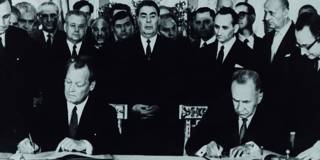The war in Ukraine has suddenly shattered the political foundations of Germany’s longstanding energy partnership with Russia. But given today’s geopolitical complexities and the demands of the energy transition, it would not be surprising if pressure to rekindle the relationship eventually reemerges.
LONDON – Since the Ukraine war began in late February, Europe has faced a reckoning over an energy relationship with Russia that originated in the Soviet era. Nowhere has the shock been more profound than in Germany.
Germany’s reliance on Russian energy was premised on détente in Europe during the Cold War and then on peace after the Soviet Union collapsed in 1991. Despite crises that could have derailed it, the partnership proved robust through six decades of shifting US-Soviet and later US-Russia relations, most notably when the Soviet-backed Polish government introduced martial law in December 1981. But Russia’s full-scale war against Ukraine has suddenly shattered the partnership’s political foundations.
Although Germany still wishes to import large volumes of Russian gas, its government clearly has gone much further in supporting energy sanctions than it envisaged in the first week of the war. In the fifth package of EU sanctions, adopted on April 8, Germany accepted a ban on Russian coal imports. Later that month, Robert Habeck, Germany’s vice chancellor and minister for economic affairs and climate action, said that a ban on Russian oil was “manageable.” Now the European Union, as part of its sixth round of sanctions, is moving to phase out Russian sea-borne imports by the end of 2022.

LONDON – Since the Ukraine war began in late February, Europe has faced a reckoning over an energy relationship with Russia that originated in the Soviet era. Nowhere has the shock been more profound than in Germany.
Germany’s reliance on Russian energy was premised on détente in Europe during the Cold War and then on peace after the Soviet Union collapsed in 1991. Despite crises that could have derailed it, the partnership proved robust through six decades of shifting US-Soviet and later US-Russia relations, most notably when the Soviet-backed Polish government introduced martial law in December 1981. But Russia’s full-scale war against Ukraine has suddenly shattered the partnership’s political foundations.
Although Germany still wishes to import large volumes of Russian gas, its government clearly has gone much further in supporting energy sanctions than it envisaged in the first week of the war. In the fifth package of EU sanctions, adopted on April 8, Germany accepted a ban on Russian coal imports. Later that month, Robert Habeck, Germany’s vice chancellor and minister for economic affairs and climate action, said that a ban on Russian oil was “manageable.” Now the European Union, as part of its sixth round of sanctions, is moving to phase out Russian sea-borne imports by the end of 2022.